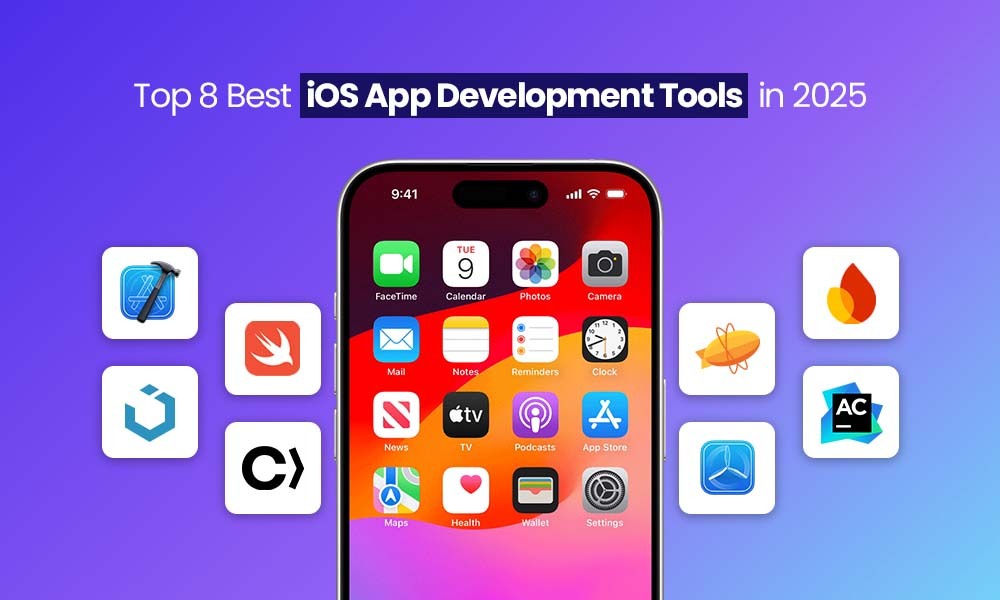
If you are planning to build an iOS app, the tools and technologies can feel overwhelming. The good news is that you don’t need everything at once, and you certainly don’t have to do all the heavy lifting yourself, because we are here to help.
Brief Overview of Top iOS Mobile App Development Tools
Before we take a deep dive into the technicalities and descriptions of tools, here is a quick check of pricing and features.
8 Best iOS App Development Tools & Software in 2025
Now that you have a brief idea of the tools, here is an in-depth review of the aforementioned iOS mobile app development software.
1. Xcode
Xcode is a premium app development tool by Apple, officially for developing apps for Apple platforms. It offers comprehensive features, fit to develop, test, and distribute apps, including predictive code completion, generative intelligence, advanced profiling, debugging tools, and simulators.
There are lots of guides and resources (including documentation and additional tools) available on the Xcode website, and you can find plenty of community support, in case any issue persists.
2. Swift
Swift is a highly powerful and modern programming language from Apple that helps develop apps for Apple platforms. Swift is fairly easy to start with and offers a concise yet expressive syntax and innovative features. It is highly loved by the app developers as well as the iOS app development services company in USA.
If you are new to Swift, you can find the get started guide, called Swift Pathway, on the tool’s webpage. It is an easy-to-operate collection of resources that helps learn the basics. Moreover, you can find different Swift tools, documentation, sample code, videos, and more on the webpage, plus a lot of community support to help you navigate the challenges much easily.
3. Visual Studio Code
Visual Studio Code is a powerful and open-source coding tool from Microsoft. You can code from anywhere for better productivity, whether connected to a cloud, a remote repository, or using the VS Code web.
Microsoft has also introduced AI features in VS Code for free, using just your GitHub account. The AI-powered features and functionalities include Agent mode, Next edit suggestions, and Code with extensions. You can also fully customize your VS Code UI and layout, including color themes, settings sync, and profile, to match your coding style.
4. Flutter
Flutter is a highly popular, open-source framework, developed and supported by Google and uses the Dart programming language. It allows users to build beautiful, natively compiled, and multi-platform applications from a single codebase. It is not only great for iOS mobile app development, but users can also test and deploy apps for any screen.
Flutter is fast, compiling code to ARM or Intel machine code and also JavaScript. Using Flutter is productive, as it comes with Hot Reload, which allows users to see changes almost instantly. Lastly, Flutter is flexible, allowing users to control every pixel to create customized and adaptive designs for any screen.
5. React Native
React Native is one of the most popular, open-source iOS app development tools, developed and supported by Meta Platforms. It can help create native apps, using JavaScript and JSX, without compromising users’ experiences.
React Native has many notable features and functionalities for seamless and powerful iOS app development. It comes with file-based routing, allows using any library, SDK, or native code, and provides access to developer tools. There are tons of guides to get started with React Native, plus a wide community support.
6. Adobe XD
Adobe XD is another powerful iOS mobile app development software for designing and prototyping iOS mobile applications. It allows developers to create advanced user interfaces, build interactive prototypes, and share designs with others.
Adobe XD does not help generate code, but offers tools to create assets. The design and prototyping tools include UI Kits, templates, artboards, and layouts. You can then export assets, use the design specs feature to inspect details, and collaborate with others for feedback. To convert them into native iOS code, you can go with the manual option, use third-party tools, or use the Ionic Framework. Adobe XD is a complex tool, and you may need to hire iOS app developer USA or work with an iOS app development services company USA to build apps.
7. TestFlight
TestFlight is another helpful tool by Apple, which makes app testing easy and simple. You can share the beta version of your apps and collect feedback from just your team or the public, before you publish.
It is fairly easy to get started with TestFlight. You can share up to 100 builds and start testing multiple builds at once. Also, you can invite internal and external testers once your build is uploaded.
8. APPlyzer
APPlyzer is among the highly useful iOS mobile app development tools that help with App Store Optimization (ASO). It is great for tracking, analyzing, and optimizing your app’s performance for more success.
You can try APPlyzer for free and start testing your apps. Many startups, businesses, and companies offering iOS app development USA trust APPlyzer to gain valuable insights, monitor rankings, and optimize strategy to stay one step ahead of their competition.
Final Takeaway
A powerful, scalable, and reliable iOS app development idea can help improve business standings and unlock success. With the right tools and a skilled iOS app development company USA, you can build a stunning app that delivers value.
If you want help, The Apptitude is here to help. We are a premium iOS app development company in USA with experts by our side. We specialize in different industries, and can help you design, test, and launch successful iOS apps, from simple ones to enterprise-level solutions. Collaborate with us to get started.

